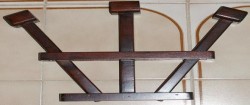ITALY CHRONICLES
Latest Posts

New! Italy Photo Contests – Show Off Your Photos of Italy
If you, like me, you think Italy is extremely photogenic, you might be interested to hear that Italy Chronicles is to run photo contests. The
Italian Politics – Still a Mess
Here’s a roundup stroke overview of what’s going on in the decidedly odd world of Italian politics. Broadly, there are three political factions in Italy,
Wild Boar Hunting in Italy
Ever thought about wild boar hunting in Italy? Maybe not but perhaps you might like to. Italy has a bit of a problem with wild
Berlusconi Heart
On Thursday in Italy headlines were dominated by the news that Silvio Berlusconi, a former and controversial prime minister, required an urgent heart operation and had
Money People – The World’s Biggest Problem
What’s that old saying? Ah yes, “money is the root of all evil”. From what is happening in Italy and elsewhere around the world, there
Italian Politics – Still a Mess
Here’s a roundup stroke overview of what’s going on in
Wild Boar Hunting in Italy
Ever thought about wild boar hunting in Italy? Maybe not
Berlusconi Heart
On Thursday in Italy headlines were dominated by the news
Money People – The World’s Biggest Problem
What’s that old saying? Ah yes, “money is the root
Italy

Is the Vatican the Hub of an Unholy International Paedophile Ring?
After a damning United Nations’ report which criticised the handling paedophilia by the Roman Catholic Church, the Vatican is not at all happy. Maybe Italians

A Most Unusual Musical Instrument – the Triccheballacche
The Triccheballacche (top marks if you can pronounce it, by the way!) is a traditional Italian musical instrument. Made of wood, this instrument consists of three
Italy’s Sordid Cases of Baby Prostitution
Prostitution by minors in Italy is termed ‘baby prostitution‘ even if those concerned are not actually infants. Recently in Italy an increasing number of cases
Accident Black Spot Milan, Italy – accident not an hour ago
Yet another accident today right outside my house. A motorcyclist hit a car, and was taken away by ambulance, not half an hour ago.

In Memoriam: Murdered Italian Journalists Ilaria Alpi and Miran Hrovatin
Few beyond Italy’s borders will have heard of late Italian journalists Ilaria Alpi who was murdered in Somalia along with cameraman Miran Hrovatin this very
Summer Hits in Italy from 1963 to 2003
Like most nations around the world, Italy has its summer hits. Some of these summer tunes are played so much they are labelled ‘tormentoni’ by

How I dislike the Italian Verb Piacere!
I’ve lost count of the number of times my dear
List of the Deceased, Abruzzo Earthquake, Italy
It is still not clear how many victims the recent earthquake which hit the Italian city of L’Aqulia and the surrounding area in Abruzzo will claim, however some of the comments left on another of my posts on this tragedy left me thinking that a list of the deceased might be useful.
Properties

How to Find Property for Rent in Italy
Maybe you are coming to Italy to work or study here for a while, in which case, you’ll need somewhere to live. If that’s the

The Admirable Admiral’s Villa in Taormina
If you know your history pretty well, you may be aware that one of England’s most celebrated Admirals possessed a rather charming villa in the scenic Sicilian town of Taormina.
House For Sale near Milan
Gaetano Salvo, friend and Blog from Italy researcher wants to sell his house. For those who might be interested, or may know of someone or

How to Find Property for Rent in Italy
Maybe you are coming to Italy to work or study here for a while, in which case, you’ll need somewhere to live. If that’s the

The Admirable Admiral’s Villa in Taormina
If you know your history pretty well, you may be aware that one of England’s most celebrated Admirals possessed a rather charming villa in the scenic Sicilian town of Taormina.
Places to stay in Italy
Villa Miller Bed and Breakfast, Puglia, Italy
Located well off the main road in the depths of the Puglia countryside, Villa Miller the only sounds which disturb guests are those of the crickets and the ringing of the bells worn by the areas cow and sheep population.
Chaplin Bed and Breakfast Rome
Perfectly located in a safe and quiet but extremely central Rome neighborhood, the Chaplin Bed and Breakfast Rome is the ideal base for your Roman holiday.
Casa Villatalla B&B, Liguria
By far the most important members of the Casa Villatalla household are Nellie (an elderly but loveable chocolate Labrador), Bonnie, a fluffy and rather scatty American Spaniel, and Pickle, aneccentric cat who walks like John Wayne.
Casa Villatalla B&B, Liguria
By far the most important members of the Casa Villatalla household are Nellie (an elderly but loveable chocolate Labrador), Bonnie, a fluffy and rather scatty American Spaniel, and Pickle, aneccentric cat who walks like John Wayne.
Chaplin Bed and Breakfast Rome
Perfectly located in a safe and quiet but extremely central Rome neighborhood, the Chaplin Bed and Breakfast Rome is the ideal base for your Roman holiday.

